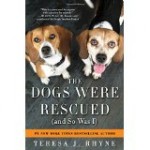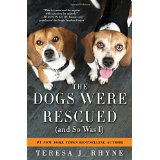 The charming pair of beagle faces peering up from the cover of The Dogs Were Rescued (and So Was I) by Teresa J. Rhyne may have some readers thinking that this book is another dog-meets-human story, à la Marley & Me. Well, it is—but it’s so much more than that. As the story unfolds, we’re taken along on the author’s personal, page-turning, often laugh-out-loud funny journey to going vegan and becoming an animal advocate.
The charming pair of beagle faces peering up from the cover of The Dogs Were Rescued (and So Was I) by Teresa J. Rhyne may have some readers thinking that this book is another dog-meets-human story, à la Marley & Me. Well, it is—but it’s so much more than that. As the story unfolds, we’re taken along on the author’s personal, page-turning, often laugh-out-loud funny journey to going vegan and becoming an animal advocate.
This book picks up where Rhyne’s previous bestseller, The Dog Lived (and So Will I), leaves off. (Warning: spoiler alert!) Rhyne and her beloved beagle, Seamus, are both cancer survivors—but Seamus’ cancer returns, and this time it’s terminal. As part of her effort to help him cope with the cancer (and prevent her own from returning), Rhyne takes a closer look at what she has been feeding Seamus—and herself. She starts watching documentaries, such as Forks Over Knives and Food, Inc., and is horrified to learn about all the ways in which animals used for food are abused. Rhyne reads and watches everything she can about the meat, egg, and dairy industries—and after having many vivid nightmares involving abused animals, she eventually goes vegan.
Seamus’ health declines, and he soon has to be euthanized. While she’s still grieving for Seamus, Rhyne unexpectedly adopts two other beagles: Daphne, from an animal shelter, and Percival, rescued from a laboratory by the Beagle Freedom Project. Curious about Percival’s former “life” (if spending every day locked inside a laboratory cage can be called a life), Rhyne begins to learn more about animal testing. She’s appalled by what she discovers and quickly purges her home of all animal-tested products and resolves to buy only cruelty-free products from then on.
But the story doesn’t end “happily ever after” just yet. Daphne and Percival are aggressive toward each other at first—understandably, given their traumatic pasts—and can’t be left alone together. The conflict between the dogs parallels Rhyne’s own inner conflict over how to live a more compassionate lifestyle now that she has been enlightened. In the midst of her struggle, Rhyne berates herself over her former ignorance of the ways in which her choices were causing animals to suffer, and she seems unsure of how—aside from being vegan and only using cruelty-free products—she can make a difference for animals now.
In time, Daphne and Percival settle into a peaceable coexistence and Rhyne makes peace with her life and future. At the close of the book, she’s firm in her beliefs and more determined than ever to help animals—and she begins by writing this book.
Rhyne is endearing, funny, and relatable, and she comes across as passionate—not preachy—when writing about the exploitation of animals. It would be nearly impossible to finish reading this book without considering one’s own relationship to animals. In this passage, Rhyne describes some of the illusions that she harbored about cows before finally learning the truth:
I must have decided that female cows just magically produced milk to fill my glass, to make my beloved cheese … and still had plenty left to feed her baby. You know, the one or two she had every few years when she felt like it or met a cute bull. In order to not question the authority or dogma I’d been fed (‘happy cows!’), that’s what I needed to believe. There was no rape rack (a dairy industry term, not mine) to keep Bessie pregnant with injected sperm taken from a male cow in what could only be described as bestiality, no calf was ripped from her at birth, still wet and crying for [his or her] mama ….
The Dogs Were Rescued (and So Was I) is a pleasure to read and has huge potential to persuade people who love dogs to extend their compassion to all animals by choosing not to eat them or buy products tested on them. Readers who pick up the book hoping for a simple feel-good dog story might be disappointed, but they’ll definitely be enlightened—and maybe even changed forever.





